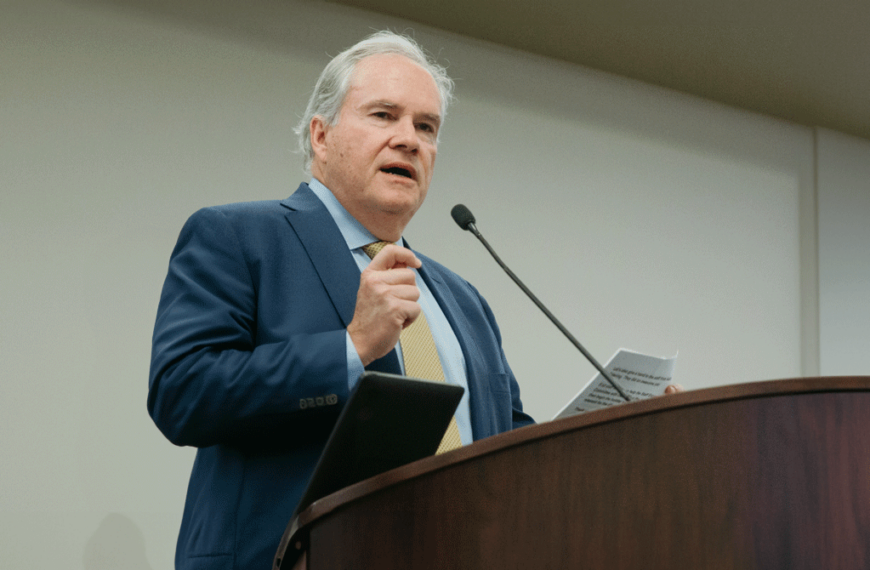There’s an old axiom that goes, “If you’re not at the table, you’re on the menu.”
The anonymous adage has been credited to a variety of individuals, mostly politicians, which makes sense considering the nature of lawmaking.
Standing before lawmakers to articulate the needs, trials and triumphs of hospitals and the communities they serve is necessary to ensure that health care policy is rooted in reality.
“Often at THA, we have attorneys testifying or other employees at THA,” says Cameron Duncan, J.D., vice president of Advocacy and Public Policy at THA. “However, it is so vital and imperative and translates much better when someone directly from the industry is sharing their story with a lawmaker.”
Before a bill becomes law in Texas, it must be referred to a committee in either the House or the Senate. Throughout the legislative process, members of the public have the opportunity, and the civic responsibility, to speak with committee members directly about the bill in an open forum. This is referred to as public testimony.
Over the course of three legislative sessions, Duncan has testified at the Texas Capitol over 50 times in various committees in the Texas House and Senate. He has also coached many outside testifiers, most recently THA Leadership Fellows.
THA’s current cohort of Leadership Fellows had the unique opportunity to experience what testifying in front of a Texas Senate committee feels like. Fellows were divided into groups and asked to deliver mock testimony before a panel of THA’s lobbyists and advocacy staff on a health care-related bill. They would then field questions from the panel that reflected real-world questions posed in committee hearings.
“It’s important that health care leaders have the experience and practice of testifying because once you’re at the Capitol, the stakes are much higher and you’re going to be nervous,” Duncan says. “So having the practice of going through it once, experiencing what the questions are like and just going through the formalities is so important.”
Here are some practical tips from Duncan on how health care leaders can best prepare to deliver effective testimony at the Texas Capitol.
Preparing to Testify
As you prepare your testimony, consider the following:
- Use bullets, not a script. As you prepare to testify, consider writing all the points you want to make in bullet points instead of writing an entire script to read from verbatim. This will allow you to jump around more freely and not get easily derailed if interrupted.
- Memorize your introduction. Everyone who testifies on a bill must open with an introduction. This introduction will include addressing the committee chair, stating your name, the organization you represent and your position on the bill. Memorizing this simple introduction is a good way to build your momentum.
- Time your remarks. Most committees limit testimony to two or three minutes.
- Watch public testimony ahead of time. Try to watch public testimony from the committee you’ll be testifying in. Live and archived testimony from the Texas House of Representatives can be found here. Live testimony from the Texas Senate can be found here and archived testimony can be found here.
The Day of Your Testimony
- Show up for the committee hearing on time. Prepare to stay until the end of the hearing as bills are not always heard in the order listed on the agenda.
- Register as soon as you arrive. House and Senate committees have electronic registration on iPads outside of the hearing room.
During Your Testimony
- Prepare to be interrupted. Committee members often pose questions amid testimony. Use this as an opportunity to educate them or provide clarification but try not to let it derail your remarks. Interruptions also provide you with more time to testify.
- Never interrupt someone on the committee who is speaking. Patiently listen and answer their question if you have an answer.
- Remain calm and professional. Committee discussions can get heated and may include banter that is contrary to what you believe are the facts. Never let such discourse affect your demeanor.
- Never make up an answer. Saying, “I don’t know, but I will find out and follow-up with your office,” is a perfectly acceptable response to a question.
- Thank the committee. Always close your testimony with a thank-you to the committee and an offer to answer their questions.
Testifying before lawmakers is a conduit for bidirectional communication where lawmakers gain insight into hospitals’ real-world challenges and health care leaders can better understand the legislative nuances that drive policy. Without the participation of health care leaders, lawmakers are left to rely on the words and perspectives of other groups, which might not accurately represent the complexity of health care delivery.
“We hear all the time from lawmakers that they are undecided on a bill, and they want to see how public testimony pans out,” Duncan says. “So, it’s not just a formality. It actually is vital and does inform the process.”
Duncan understands that, despite their expertise, health care leaders might still be nervous about speaking in front of committee members. However, after three legislative sessions, Duncan knows that real-world experience trumps everything.
“I would tell a first-time testifier that they know much more about the topic than anybody else in the room and they should take comfort in that.”
Learn more about THA’s advocacy in action, including public testimony delivered during the 88th legislative session here.
Learn more about THA’s Leadership Fellows program here.
Related articles from The Scope
Repeal of 2024 Cuts Are a Needed First Step to Protect Our Safety Net
Every piece of financial certainty our hospitals can get these days is appreciated – especially for the facilities that treat the most vulnerable Texans. For the rest of this year,…
Workplace Violence: Breaking a Cultural Norm
When the Texas Hospital Association pushed for key steps to protect health care workers from violence during last year’s state legislative session, it was trying to reverse a long-standing pattern…
How FQHCs Can Stay HRSA-Compliant
Health care compliance — adhering to rules, standards, policies, laws, and regulations related to medical practices — is about keeping operations running smoothly. It also promotes safe, high-quality care, and…
Meet THA’s 2024 Class of 24 Leadership Fellows
Last week, the Texas Hospital Association convened its 2024 cohort of Leadership Fellows at THA headquarters in Austin for the first of four in-person, two-day modules. With 24 fellows participating…





